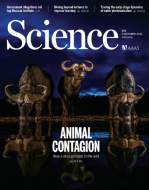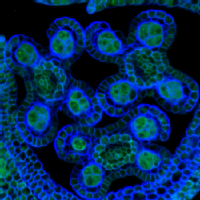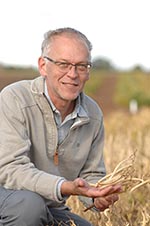Life Sciences News
See our Latest Journal Publications
New health economic framework to help assess what might be required to eliminate African sleeping sickness by 2030
An international group of researchers have created a new health economic framework that supports decision makers and funders in understanding the resources required to achieve the World Health Organization’s (WHO) goal of eliminating sleeping sickness by 2030.
Press release (13 December 2021)
Professor Hendrik Schaefer is part of expert delegation attending COP26
 Environmental microbiologist Professor Hendrik Schaefer is one of 17 University of Warwick delegates taking their expertise to COP26. The university is one of a limited number of institutions to have been granted official observer status by the UN-led conference, which is being hosted by the UK.
Environmental microbiologist Professor Hendrik Schaefer is one of 17 University of Warwick delegates taking their expertise to COP26. The university is one of a limited number of institutions to have been granted official observer status by the UN-led conference, which is being hosted by the UK.
Press release (20 October 2021)
Warwick COP26 researchers and academic experts attending announced (28 October 2021)
Dr Freya Harrison wins WH Pierce Prize 2021
 Dr Freya Harrison has been awarded the WH Pierce Prize 2021 by the Society for Applied Microbiology for her work in translating medieval literature and medical texts to uncover ancient antimicrobial recipes.
Dr Freya Harrison has been awarded the WH Pierce Prize 2021 by the Society for Applied Microbiology for her work in translating medieval literature and medical texts to uncover ancient antimicrobial recipes.
Press release (14 October 2021)
New research giving insight into the persistence of highly contagious foot-and-mouth disease virus features on front cover of Science Magazine
 A major new study, featured on the cover of Science Magazine today (1 October 2021), undertaken by Dr Erin Gorsich and colleagues at The Pirbright Institute, Oregon State University, Onderstepoort Veterinary Institute and SANParks, Veterinary Wildlife Services, Kruger National Park explores the mechanisms at play that enable the persistence of highly infectious pathogens in their host populations, a major problem in endemic disease ecology.
A major new study, featured on the cover of Science Magazine today (1 October 2021), undertaken by Dr Erin Gorsich and colleagues at The Pirbright Institute, Oregon State University, Onderstepoort Veterinary Institute and SANParks, Veterinary Wildlife Services, Kruger National Park explores the mechanisms at play that enable the persistence of highly infectious pathogens in their host populations, a major problem in endemic disease ecology.
Press release (1 October 2021)
SLS researcher named as Turing Fellow
 Congratulations to Professor Mike Tildesley on being named as a Fellow of the Alan Turing Institute this year.
Congratulations to Professor Mike Tildesley on being named as a Fellow of the Alan Turing Institute this year.
Press release (30 September)
Researcher on fast track thanks to dementia charity founded by F1 legend
Dr Emily Hill, a School of Life Sciences researcher investigating Alzheimer’s disease, has been named as one of four new Race Against Dementia Fellows, with the opportunity to receive support from not only leading scientists studying dementia, but also experts in innovation and problem solving from the world of Formula 1.
Press release (23 September 2021)
SLS academic recognised in Queen's birthday honours
 Professor Matt Keeling has been recognised in the 2021 Queen’s Birthday Honours List for services as an advisor to the government’s Scientific Advisory Group for Emergencies (SAGE) with an OBE.
Professor Matt Keeling has been recognised in the 2021 Queen’s Birthday Honours List for services as an advisor to the government’s Scientific Advisory Group for Emergencies (SAGE) with an OBE.
Commenting on his being awarded an OBE, Professor Keeling said:
“I'm absolutely thrilled by this award. This is great recognition of all the hard work of the entire Warwick group and the wider Juniper team over the last 15 months."
Press Release (15 June 2021)
Starving Tuberculosis (TB) of sugars may be a new way to fight it
Tuberculosis is a devastating disease that claims over 1.5 million lives each year. The increase in TB cases that are resistant to the current antibiotics means that novel drugs to kill Mycobacterium tuberculosis (Mtb) are urgently needed. Dr Elizabeth Fullam and colleagues have successfully discovered how Mycobacterium tuberculosis uses an essential sugar called trehalose, which provides a platform to design new and improved TB drugs and diagnostic agents.
Press Release (15 April 2021)
Construction completed on “world-class” biomedical research building
 Our impressive new IBRB biomedical research building has been completed. The new state-of-the-art lab spaces will support our interdisciplinary world-class research in neuroscience, microbiology and infection, and cell biology.
Our impressive new IBRB biomedical research building has been completed. The new state-of-the-art lab spaces will support our interdisciplinary world-class research in neuroscience, microbiology and infection, and cell biology.
Press Release (24 March 2021)
How bacterial traffic jams lead to antibiotic-resistant, multilayer biofilms
New insight on the physical interactions that take place between swarming bacteria when exposed to antibiotics could lead to novel approaches for treating infections in patients. The bacterial equivalent of a traffic jam causes multilayered biofilms to form in the presence of antibiotics, shows a study by Dr Munehiro Asally and colleagues.
Press Release (16 March 2021)
Identified: A mechanism that protects plant fertility from stress
 As temperatures rise due to global warming the need to protect plants from stressful conditions has increased, as stress can cause a loss in yield and cause further impact economically. A consortium led by Professor Jose Gutierrez-Marcos have successfully identified two proteins that protect crops from stress, which is key in safeguarding food production.
As temperatures rise due to global warming the need to protect plants from stressful conditions has increased, as stress can cause a loss in yield and cause further impact economically. A consortium led by Professor Jose Gutierrez-Marcos have successfully identified two proteins that protect crops from stress, which is key in safeguarding food production.
Press Release (1 March 2021)
New research finds no evidence that schools are playing a significant role in driving spread of the Covid-19 virus in the community
New research by epidemiologist Dr Mike Tildesley and colleagues has found that there is no significant evidence that schools are playing a significant role in driving the spread of the Covid-19 disease in the community, particularly in primary schools. However, careful continued monitoring may be required as schools re-open to stay well informed about the effect they have upon community incidence.
Press Release (15 February 2021)
University of Warwick signs agreement with agronomy specialist to bring UK beans to market
 The University of Warwick’s research commercialisation wing, Warwick Innovations, has signed a contract with agronomy specialist Agrii to promote the commercial production of UK haricot beans developed by Professor Eric Holub from Warwick’s Crop Centre, part of the School of Life Sciences. Professor Holub has bred three haricot bean varieties which are adapted for growing in the UK climate and are more suited to standard farm machinery.
The University of Warwick’s research commercialisation wing, Warwick Innovations, has signed a contract with agronomy specialist Agrii to promote the commercial production of UK haricot beans developed by Professor Eric Holub from Warwick’s Crop Centre, part of the School of Life Sciences. Professor Holub has bred three haricot bean varieties which are adapted for growing in the UK climate and are more suited to standard farm machinery.
“Self-sufficiency in food production is important for reducing human impact on global climate. British-grown beans can help us shift our diets to a healthier future, adding to other UK ingredients to supply the growing trend of flexitarian diets with new markets like Brit-Mediterranean and Brex-Mexican style food.” Professor Holub.
Press Release (9 February 2021)
Soil bacteria hormone discovery provides fertile ground for new antibiotics
 Research by Dr Chris Corre and colleagues could lead to improved manufacturing of existing antibiotics, and open up opportunities to discover new ones.
Research by Dr Chris Corre and colleagues could lead to improved manufacturing of existing antibiotics, and open up opportunities to discover new ones.
Press Release (3 Feb 2021)
Warwick named as one of the world's Most International universities
The University of Warwick has been named as one of the world’s top 20 Most International universities by the Times Higher Education (THE) – ranked 20th overall and 10th in the UK.
Press Release (2 Feb 2021)
New centre puts farmer priorities at heart of innovation research
Warwick has joined forces with the University of Reading, Royal Agricultural University, Harper Adams University and Newcastle University to focus agricultural research where it can make most difference on the ground. The new Centre for Effective Innovation in Agriculture (CEIA) will see the universities work together to address the gap between scientific research on innovation and real-life farming experience. The centre will focus on how research and development investment can best support innovation to be adopted by farmers.
Press Release (5 December 2020)
Chemical memory in plants affects chances of offspring survival
Professor Jose Gutierrez-Marcos and an international team of researchers have uncovered the mechanism that allows plants to pass on their ‘memories’ to offspring, which results in growth and developmental defects.
Press Release (1 December 2020)
Warwick scientists design model to predict cellular drug targets against Covid-19
A computational model of a human lung cell has been used to understand how SARS-CoV-2 draws on human host cell metabolism to reproduce by Dr Hadrien Delattre and Professor Orkun Soyer. This study helps understand how the virus uses the host to survive, and enable drug predictions for treating the virus to be made.
Press Release (25 November 2020)
Diabetic drug could slow the progression of Parkinson’s disease
A hallmark of Parkinson's disease is the degeneration of a group of neurons in the brain that release the neurotransmitter dopamine (dopaminergic neurons). By introducing low concentrations of structurally-defined aggregates of alpha synuclein, a key toxic species in Parkinson’s disease, into single dopaminergic neurons, Emily Hill and Dr Mark Wall have shown these protein aggregates open a specific channel in the cell membrane, reducing neuronal excitability.
Press Release (24 November 2020)
Breakthrough in studying the enzyme that ultimately produces fish odour syndrome
Fish odour syndrome (trimethylaminuria) is a debilitating disease, in which the liver cannot break down the smelly chemical trimethylamine which is produced by enzymes from bacteria residing in the gut leaving people with a fish like odour. Dr Mussa Quareshy and colleagues are paving the way to prevent the syndrome after a breakthrough in studying the enzyme in the gut which produces trimethylamine.
Press Release (23 November 2020)
